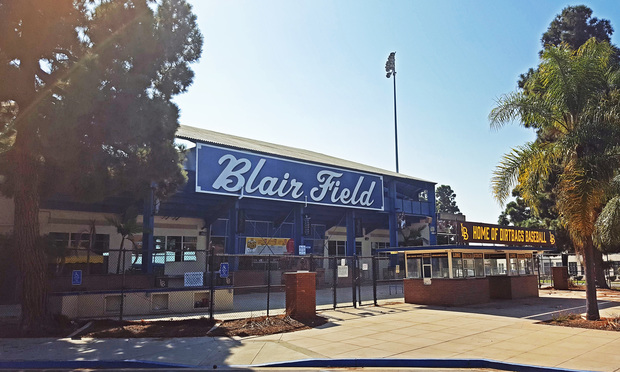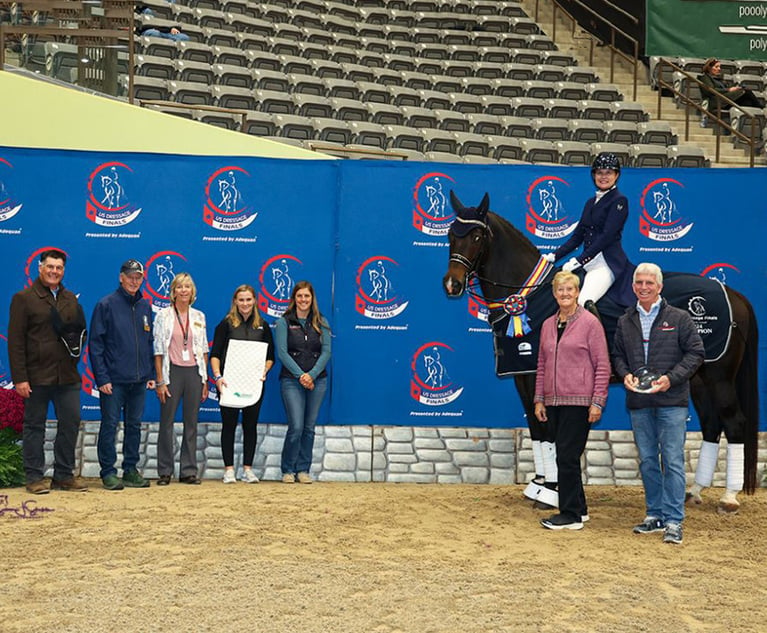Baseball Fan Can Sue Over Foul Ball to the Face, California Appeals Court Rules
In a departure from prior case law, California's Second District Court of Appeal ruled that baseball organizations have a higher duty of care to spectators after a 12-year-old was hit in the face by a foul ball.
February 19, 2020 at 04:31 PM
4 minute read
The original version of this story was published on The Recorder
 Blair Field is a stadium in Long Beach, California.
Blair Field is a stadium in Long Beach, California.
A foul ball to the face is not an anticipated part of the sport, nor an assumed risk for baseball spectators, according to an appeals court decision.
California's Second District Court of Appeal ruled Tuesday that installing protective netting along the first- and third-base lines at ball parks would not necessarily alter the nature of the game, signaling a shift in the court's interpretation of the primary assumption of risk doctrine.
A 12-year-old, referred to as Summer, brought the appeal against the United States Baseball Federation after a line drive foul ball damaged her optic nerve while attending the national team trials at California State University, Long Beach's Blair Field in 2014, according to the opinion. Upon appeal, she alleges that changes to the sport including front-row seating closer to the field and distractions such as digital advertising and enhanced WiFi to encourage social media engagement have increased the risks for spectators at the park.
In opposition to Los Angeles Superior Court, the appeals court found that professional and college baseball organizations have a duty to fans beyond not creating any additional risk than the inherent danger of the activity, especially given that Major League Baseball Commissioner Rob Manfred has mandated that teams roll out expanded protective netting for the 2020 season.
"These cramped descriptions by the trial court and US Baseball fundamentally misperceive the nature of US Baseball's duty to fans attending the August 17, 2014 national team trials," wrote Presiding Justice Dennis Perluss of the of the California Second District Court of Appeal, on behalf of Associate Justices John Segal and Gail Ruderman Feuer. "To be sure, foul balls are part of baseball. But as the entity responsible for operating Blair Field on that date, US Baseball had a duty not only to use due care not to increase the risks to spectators inherent in the game but also to take reasonable measures that would increase safety and minimize those risks without altering the nature of the game."
The court reversed US Baseball's demurrer and a post-judgement order requiring Summer to pay nearly $5,000 in costs and fees, and remanded the case to LA Superior with directions to grant the baseball fan leave to file her second amended complaint.
US Baseball's Los Angeles-based counsel Sevan Gobel of Andrews Lagasse Branch & Bell and Ladell Hulet Muhlestein of Manning & Kass, Ellrod, Ramirez, Trester did not respond to a request for comment at the time of publication.
Perluss ruled that an amended complaint incorporating the views of experienced baseball pros such as Manfred point to an enforceable duty, at least for pleading purposes.
"Whether the evidence will support those allegations, which will require an evaluation of the extent of the stadium's existing netting, the proximity of unprotected seats to the playing field and the history of previous injuries in the seating area at issue, is not now before us," he said.
Summer's attorneys—which include The Law Offices of Michels & Lew's Steven Stevens in Los Angeles; Thomas Dempsey of the Law Office of Thomas M. Dempsey in Beverly Hills; and Daniel E. Selarz of Selarz Law Corp.—did not respond to calls and emails seeking comment Wednesday afternoon.
In 2014, the Georgia Court of Appeals rejected a plea by the Atlanta Braves that it determine whether the so called "baseball rule" shielded the team from being sued by the parent of a child hit by a foul ball at Turner Field.
The "baseball rule," a standard other states had adopted, says stadium owners and operators are immune from suits over foul balls if they provide enough seats behind home plate protected by a net to meet fans' demands for such seating.
Attorneys for the Braves had appealed a trial court judge's refusal to declare that the team had met its duties to protect spectators at Turner Field, where in 2010 a 6-year-old girl sitting a few rows behind the visitors' dugout was hit by a foul ball that fractured her skull in multiple places and caused traumatic brain injury, according to court filings.
The appellate panel's decision focused narrowly on whether the trial judge, Fulton County State Court Judge Patsy Porter, had properly followed the law regarding declaratory judgment rulings, said an attorney for the father.
After the ruling, the case settled confidentially.
The Daily Report added material to this article, which first ran in The Recorder, an affiliate in California.
This content has been archived. It is available through our partners, LexisNexis® and Bloomberg Law.
To view this content, please continue to their sites.
Not a Lexis Subscriber?
Subscribe Now
Not a Bloomberg Law Subscriber?
Subscribe Now
NOT FOR REPRINT
© 2025 ALM Global, LLC, All Rights Reserved. Request academic re-use from www.copyright.com. All other uses, submit a request to [email protected]. For more information visit Asset & Logo Licensing.
You Might Like
View All


'It Refreshes Me': King & Spalding Privacy Leader Doubles as Equestrian Champ
5 minute read
Federal Judge Rejects Teams' Challenge to NASCAR's 'Anticompetitive Terms' in Agreement
Trending Stories
- 1Uber Files RICO Suit Against Plaintiff-Side Firms Alleging Fraudulent Injury Claims
- 2The Law Firm Disrupted: Scrutinizing the Elephant More Than the Mouse
- 3Inherent Diminished Value Damages Unavailable to 3rd-Party Claimants, Court Says
- 4Pa. Defense Firm Sued by Client Over Ex-Eagles Player's $43.5M Med Mal Win
- 5Losses Mount at Morris Manning, but Departing Ex-Chair Stays Bullish About His Old Firm's Future
Who Got The Work
J. Brugh Lower of Gibbons has entered an appearance for industrial equipment supplier Devco Corporation in a pending trademark infringement lawsuit. The suit, accusing the defendant of selling knock-off Graco products, was filed Dec. 18 in New Jersey District Court by Rivkin Radler on behalf of Graco Inc. and Graco Minnesota. The case, assigned to U.S. District Judge Zahid N. Quraishi, is 3:24-cv-11294, Graco Inc. et al v. Devco Corporation.
Who Got The Work
Rebecca Maller-Stein and Kent A. Yalowitz of Arnold & Porter Kaye Scholer have entered their appearances for Hanaco Venture Capital and its executives, Lior Prosor and David Frankel, in a pending securities lawsuit. The action, filed on Dec. 24 in New York Southern District Court by Zell, Aron & Co. on behalf of Goldeneye Advisors, accuses the defendants of negligently and fraudulently managing the plaintiff's $1 million investment. The case, assigned to U.S. District Judge Vernon S. Broderick, is 1:24-cv-09918, Goldeneye Advisors, LLC v. Hanaco Venture Capital, Ltd. et al.
Who Got The Work
Attorneys from A&O Shearman has stepped in as defense counsel for Toronto-Dominion Bank and other defendants in a pending securities class action. The suit, filed Dec. 11 in New York Southern District Court by Bleichmar Fonti & Auld, accuses the defendants of concealing the bank's 'pervasive' deficiencies in regards to its compliance with the Bank Secrecy Act and the quality of its anti-money laundering controls. The case, assigned to U.S. District Judge Arun Subramanian, is 1:24-cv-09445, Gonzalez v. The Toronto-Dominion Bank et al.
Who Got The Work
Crown Castle International, a Pennsylvania company providing shared communications infrastructure, has turned to Luke D. Wolf of Gordon Rees Scully Mansukhani to fend off a pending breach-of-contract lawsuit. The court action, filed Nov. 25 in Michigan Eastern District Court by Hooper Hathaway PC on behalf of The Town Residences LLC, accuses Crown Castle of failing to transfer approximately $30,000 in utility payments from T-Mobile in breach of a roof-top lease and assignment agreement. The case, assigned to U.S. District Judge Susan K. Declercq, is 2:24-cv-13131, The Town Residences LLC v. T-Mobile US, Inc. et al.
Who Got The Work
Wilfred P. Coronato and Daniel M. Schwartz of McCarter & English have stepped in as defense counsel to Electrolux Home Products Inc. in a pending product liability lawsuit. The court action, filed Nov. 26 in New York Eastern District Court by Poulos Lopiccolo PC and Nagel Rice LLP on behalf of David Stern, alleges that the defendant's refrigerators’ drawers and shelving repeatedly break and fall apart within months after purchase. The case, assigned to U.S. District Judge Joan M. Azrack, is 2:24-cv-08204, Stern v. Electrolux Home Products, Inc.
Featured Firms
Law Offices of Gary Martin Hays & Associates, P.C.
(470) 294-1674
Law Offices of Mark E. Salomone
(857) 444-6468
Smith & Hassler
(713) 739-1250






